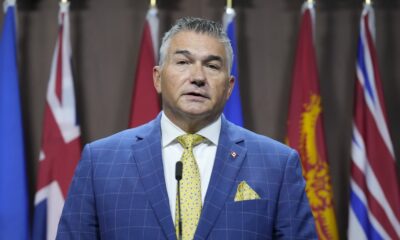Conservative bill would extend sanctions to target relatives of human rights abusers
By Canadian Press on September 16, 2025.

OTTAWA — Conservative MP James Bezan tabled a bill on Tuesday seeking to reform Ottawa’s sanctions regime to target immediate family members of human rights abusers and tackle transnational repression.
“We want to make sure that Canada is not being used as a safe haven for corrupt foreign officials that are hiding their families here,” the Manitoba MP said Tuesday on Parliament Hill.
“We have to hold those to account who are responsible for all of the crimes that we’re seeing committed against the international norms and the rule of law, and the continued abuses that we’re seeing on civil liberties and human rights around the world.”
Bezan’s bill would also bar immediate relatives of human-rights abusers from travel and financial holdings in Canada — a response to reports that Iranian officials responsible for repression abroad are sending their children to Canadian universities.
The bill also would direct the RCMP and Canada’s anti-money laundering agency Fintrac to help the government draft sanctions and ensure they are enforced. It would require that ministers respond to parliamentary requests for specific sanctions.
The bill would allow for the removal of broadcast licences from television and radio stations “vulnerable to being significantly influenced” by sanctioned entities, which would effectively ban many state-run television channels from Canadian airwaves.
Bill C-219 has the support of Liberal MP John McKay, who said it makes sense to “refresh” the legislation to address the shifting behaviour of autocracies.
“I’m looking forward to the time where this legislation gets enforced with enthusiasm and effectiveness, because the brutal way in which (Russian President Vladimir) Putin is abusing the people of Ukraine just has to stop, and Canada has to do its role,” he said.
Irwin Cotler, head of the Raoul Wallenberg Centre for Human Rights, said the bill could address concerns about countries like Iran, Russia and China conducting foreign-interference operations targeting diaspora populations in Canada.
“This legislation will protect Canada’s sovereignty, security (and) the rights of its people, while holding the major-human rights violators accountable,” said Cotler, the former attorney general.
“We have an increasing axis of authoritarianism and we need these increased remedies and refinements for accountability in the pursuit of justice.”
The bill also would compel Canada to proceed with the forfeiture of assets frozen under sanctions regimes according to legislated timelines.
Ottawa has promised for years to seize a Russian cargo plane that landed in Toronto shortly before Moscow’s full-scale invasion of Ukraine, and to forfeit millions of dollars believed to be held by oligarch Roman Abramovich. Both moves face legal challenges and would make Canada the first country to forfeit assets under sanctions laws.
The bill would rebrand the sanctions law to cite the name of Russian whistleblower Sergei Magnitsky, who died in a Moscow prison in 2009 after accusing officials of a $230-million tax fraud.
Canada already named a 2017 sanction law that targeted foreign officials after Magnitsky but that law has rarely been used. Global Affairs Canada says that’s because it can only bar certain dealings, has no exceptions, has high evidentiary thresholds and only targets individuals, not entities.
Ottawa tends to use the Special Economic Measures Act to impose sanctions. Bezan’s bill would rename that legislation.
Bezan, who was the sponsor of the 2017 law, said “Magnitsky’s name is synonymous with standing up for human rights, good governance and international peace and security.”
He was joined on Parliament Hill by Bill Browder, an American-born financier who has become a leading advocate for sanctions against Russia since the death of Magnitsky, who was his employee.
Browder said that while Canada was among the first countries to pass a Magnitsky law and inspired other countries to follow suit, it has since barely used that law.
“We found deficiencies and flaws that need to be fixed and tightened,” he said. “This is a great way of tightening up the sanctions legislation (and) not letting the bad guys get away with it.”
The legislation comes after an internal Global Affairs Canada review concluded that Ottawa runs a confusing sanctions regime that lacks resources.
Bezan said he hopes his bill can address “a number of disturbing facts” the review found and called for more government staff oversight of sanctions research, enforcement and review.
This report by The Canadian Press was first published Sept. 16, 2025.
Dylan Robertson, The Canadian Press
27-26




